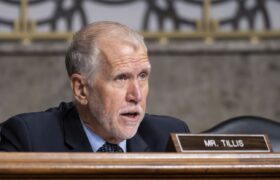In a surprising political development, Republican Senator Thom Tillis of North Carolina has announced he will not seek reelection at the end of his current term. The decision comes just one day after he cast a high-profile vote against a domestic policy bill backed by former President Donald Trump, intensifying speculation about internal divisions within the Republican Party.
Tillis, who has served in the Senate since 2015, has long been seen as a center-right Republican willing to occasionally defy party orthodoxy. His decision not to run for another term marks the end of a notable, and at times controversial, political career in a deeply divided political era.
A Sudden Departure from the Political Stage
In a written statement released by his office, Senator Tillis said that after considerable reflection, he has decided not to pursue reelection in 2026. “It has been the honor of my life to represent the people of North Carolina,” Tillis wrote. “But public service requires sacrifice, and I believe it is time to step aside and allow new leadership to step forward.”
Though Tillis did not reference his vote against Trump’s domestic policy proposal in the announcement, the timing of his decision has led many observers to draw a connection. The bill in question, aimed at rolling back elements of President Biden’s climate and infrastructure initiatives, was considered a top priority by Trump-aligned Republicans. Tillis was one of only a few GOP senators to vote against it.
Voting Against the Party Line
Tillis’s vote has highlighted ongoing tensions between traditional conservatives and Trump-aligned populists within the Republican Party. In defending his decision, Tillis cited fiscal responsibility and the long-term economic impact of the bill.
“This legislation would have disproportionately benefited short-term political interests at the expense of sound economic planning,” he told reporters. “We cannot continue to govern by division and slogans.”
While some in the GOP praised Tillis for his independence, Trump loyalists quickly criticized the senator. Former President Trump, in a social media post, called Tillis “a disappointment to the Republican base” and suggested that voters “deserve someone who will fight for the America First agenda.”
Political Career and Legacy
Thom Tillis began his political career in the North Carolina House of Representatives before being elected to the U.S. Senate in 2014. During his time in Congress, he has focused on military funding, immigration reform, and judicial appointments. He has also been a vocal advocate for veterans’ issues and bipartisan criminal justice reform.
Tillis’s moderate approach and willingness to work across the aisle have earned him praise from centrists but have also exposed him to criticism from the more conservative wing of the party. His decision not to run again is expected to open the door for a more Trump-aligned candidate to compete for the seat in 2026.
The Future of the North Carolina Senate Seat
North Carolina is considered a critical swing state, and the open Senate seat is expected to attract significant attention from both parties. Republicans are already preparing for a competitive primary, with potential candidates including Trump-endorsed state lawmakers and conservative media figures.
Democrats, meanwhile, see Tillis’s departure as a rare opportunity to flip a seat in a state that has shown signs of political realignment in recent elections. With growing urban populations and changing demographics, North Carolina is increasingly viewed as a battleground.
Senator Thom Tillis’s decision not to seek reelection marks a pivotal moment in North Carolina politics and in the broader realignment occurring within the Republican Party. His departure highlights the challenges faced by moderate conservatives in a party increasingly shaped by Trump’s influence.
As the 2026 midterm election cycle begins to take shape, Tillis’s legacy will likely be defined by his attempts to balance principle with party loyalty — a balancing act that ultimately led to both his isolation and his quiet exit from the national stage.










